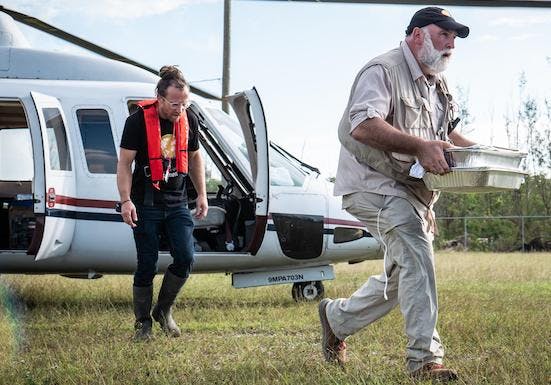‘We Feed People’ Mixes Celebrity and Humanitarian Aims, With Emphasis on Latter
The sight of José Andrés on the ground and covered in sweat helps to divert any thoughts of cynicism.

Recipient of multiple James Beard awards, José Andrés is often credited with launching the tapas craze in the U.S. in the ’90s. He owns more than 30 restaurants in New York, Los Angeles, D.C., Las Vegas, Chicago, and other cities and is widely recognized outside culinary circles, occasionally popping up on TV news segments. His celebrity stems from humanitarian efforts rather than guest appearances on the cooking show circuit.
Ron Howard’s documentary “We Feed People” profiles Mr. Andrés and his nonprofit, World Central Kitchen, which since the 2010 Haiti earthquake has been responding to disasters around the world, providing meals for those affected and their rescuers.
The opening scenes, filmed in 2018 amid the devastation wrought by Hurricane Florence in North Carolina, show the chef curtly evading a reporter’s query for his name and title. It’s unclear whether the vignette is meant to illustrate his humility or his vexation at the journalist’s ignorance.
Indeed, “We Feed People” isn’t a puff piece blatantly seeking to canonize its subject. Compared it with, say, Frank Marshall’s “Jazz Fest: A New Orleans Story,” and Mr. Howard’s film feels like a proper documentary. The comparison is warranted because both filmmakers are typically associated with Hollywood blockbusters and have dabbled in narrative nonfiction of late.
Mr. Andrés comes off as a bit of a lout at times here, making shortsighted blunders along the way. He had no choice but to abandon one truckload of prepared meals when the vehicle broke down in a flood. In Haiti, he failed to take into consideration how locals would like their food prepared — with a brief allusion to the savior complex. He’s also shown apologizing to a local elsewhere for another faux pas.
Yet, you’ve got to hand it to him: The sight of Mr. Andrés on the ground and covered in sweat helps to divert any thoughts of cynicism. When one situation demanded immediate action — the bureaucratic limitations of the Red Cross and the Federal Emergency Management Agency were well documented — he charged everything on his own credit cards and took a $1 million line of credit.
The film sheds some light on the circumstances that shaped his altruism. Both of his parents were nurses. In 1993, he became involved with Robert Egger’s D.C. Central Kitchen, training ex-cons and serving meals to the homeless. The experience was so richly rewarding for Mr. Andrés that it helped spring him into action when he was vacationing on the Cayman Islands during the Haiti earthquake. As a veteran of the restaurant industry, he happens to be a natural at sourcing supplies and managing high-pressure situations.
The film incorporates news footage and Mr. Andrés’s social media posts. It’s not clear when the actual production commenced, when Mr. Howard got involved, and how much of the footage came from World Central Kitchen’s own crew. It also lacks specifics on the scale, the costs, and the manpower entailed, and such would surely be useful in illustrating the scope of World Central Kitchen’s impact.
“We Feed People” does make it clear that Mr. Andrés isn’t pulling this off on his own. While he is very much the face of the nonprofit, there are lots of people working behind the scenes — many of them volunteers — that don’t all get their due.
The film concludes by noting systemic issues regarding food distribution and the increasing frequency and severity of natural disasters spawned by climate change, leaving the World Central Kitchen crew with little downtime. The nonprofit was also deployed at the beginning of the Covid pandemic to feed essential workers. It’s an ominous note, and Mr. Andrés is, after all, just one person in a world of problems.

